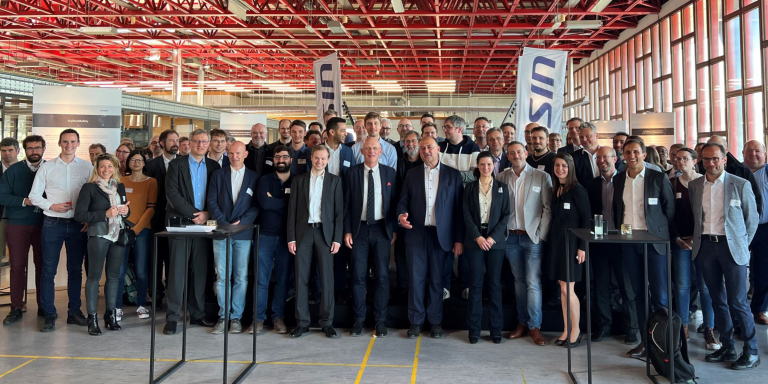
In 2019, the Walloon government launched ” DigitalWallonia4.ai” , a regional program for the appropriation and development of AI in Wallonia. As part of this program, the TRAIL (Trusted A.I. Labs) initiative was set up in September 2020 aiming to mobilize the research and innovation capacities of the Walloon and Brussels Regions in the service of their socio-economic development in the field of AI, in coherence with the regional policies carried out in this area.
The TRAIL program includes 3 axes: the Institute which gathers the actors of AI research, the AI Factory to valorize this research and the AI4Ventures to develop new services or products based on AI.
As the founding professors of the TRAIL Institute, Benoît Macq and Thierry Dutoit, remind us, “AI research cannot be conducted in isolation if it is to continue its transformative effect on our societies for the sustainable well-being of their citizens . With this objective, TRAIL aims at gathering a large community of researchers, supervised by professors from 6 French-speaking Belgian universities (UC Louvain, ULB, Uliège, UMONS, Unamur, Université de Saint Louis) as well as by researchers from four accredited research centers (CETIC, CENAERO, Multitel and Sirris) united by the will to develop a trusted AI at an international level of excellence.
The major challenges of TRAIL
One of the objectives of TRAIL is to focus advanced research on the economic needs of the Walloon territory. Moreover, the government has granted TRAIL a budget of 32 million euros over 6 years to conduct the ARIAC project (Applications and Research for Trusted Artificial Intelligence) whose objective is to create IT tools based on trusted AI, to finance hybridization activities with companies in order to strengthen the impact on the regional economic fabric.
To achieve this goal, researchers have defined 8 collective challenges in close collaboration with companies, not necessarily active in the AI sector to date. Researchers have also collaborated on these challenges during the TRAIL WORKSHOP PARIS 2021. The teams will have between 2 and 4 years to respond, the projects will be evaluated each year and readjusted if necessary. The TRAIL aims to set up four more.
Each of these challenges is placed under the responsibility of one of the accredited research centers, which coordinates the work of the researchers from the project partners. Each challenge includes one or more of the four major research themes of TRAIL, which are
- Human-IA interaction
- Trust mechanisms in AI
- Model-IA integration
- Optimized implementations of AI
The first eight challenges of TRAIL are :
- Hybridization of models and data towards augmented engineering (use case: additive manufacturing), pilot center: Cenaero;
- Physics-based models and data monitoring, with learning transfer for large systems (use case: energy performance of large-scale buildings), pilot center: Cenaero;
- Secure, reliable AI that guarantees privacy, pilot center: CETIC;
- Machine learning as an aid to operational research in optimization, pilot center: CETIC;
- Machine learning with low supervision – objective: a more general AI, pilot center: Multitel;
- Trusted AI for critical systems, pilot center: Multitel ;
- An intelligent environment powered by human-centric AI, with machines, robots, sensors and actuators in an Industry 5.0 perspective (no defects, no accidents, no burnout), pilot center: Sirris ;
- How to achieve “first time right ” and “consistent product quality” throughout the product development and production cycle with AI assistance systems?
The teams involved in these challenges will publish the technological bricks and their methodologies on the “TrAIL Factory” platform, which aims to facilitate their dissemination and valorization. It gathers:
- Open source and other software bricks developed by TRAIL partners;
- Datasets collected and possibly annotated by TRAIL partners;
- Methodologies or guidelines developed by TRAIL and provided in the form of white papers;
- Service offers concerning expertise or infrastructures for companies proposed by TRAIL;
- Open Science connectors (source or data) useful to the community, in particular those made available by public services and TRAIL partner companies.
Translated from Belgique : Focus sur les Grands Défis de l’Institut TRAIL









